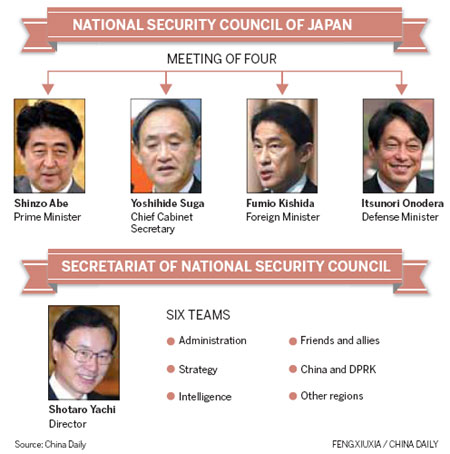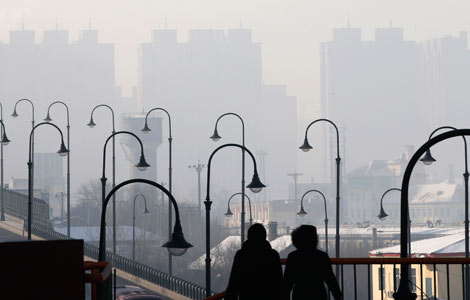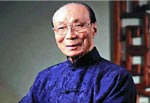Administrative branch of NSC commences work
Updated: 2014-01-08 08:16
By Zhang Yunbi (China Daily USA)
|
||||||||
The secretariat of Japan's National Security Council was launched on Tuesday to help the country's top defense policymakers coordinate teamwork within and outside Japan.
The administrative organ will bring a greater efficiency to Japan's fast-growing defense buildup as well as its strategy of deterring China with its allies, observers said.
Shotaro Yachi, a top foreign policy adviser to Japanese Prime Minister Shinzo Abe, was appointed on Tuesday to head the secretariat. Yachi, 70, a former Japanese vice-foreign minister, is a veteran expert on ties between Tokyo, Washington and Beijing.
The secretariat has about 60 secretariat officials from various government organizations, including the foreign and defense ministries as well as the National Police Agency.
"The secretariat will boost Abe's control over the policymaking organ, and will achieve two aims - dealing with China and strengthening coordination in the traditional alliance with the US," said Wang Dong, director of the Center for Northeast Asian Strategic Studies under Peking University.
One of the six secretariat teams will deal with issues concerning China and the Democratic People's Republic of Korea, a move Wang said is "an extremely hostile categorizing action" that clearly states Tokyo's strategic enemies.
Jiang Xinfeng, an expert on Japanese defense policy studies at the PLA Academy of Military Sciences, said Tokyo has been sparing no effort to sensationalize alleged threats to its security in the region.
"Japan is aiming at more breakthroughs in defense policies to get more green lights to expand the armed forces, which have been restrained by the pacifist Constitution for decades," Jiang said.
As a main supporting body of the NSC, the secretariat will coordinate operations of ministries and agencies, as well as analyze information on the international circumstances and share it with foreign government organizations.
Liu Jiangyong, an expert on Japanese studies at Tsinghua University, estimated that the follow-up measures corresponding to the secretariat may include a deeper discussion about US-Japan joint combat operations as well as updating the US-Japan defense cooperation guidelines, and all the moves will be made "inch by inch".
"In this process, information blocking (regarding security policymaking) will be enhanced and tougher controls will be imposed on public servants as well as the mass media," Liu said. "It is a threatening trend."
The secretariat begins operation as the US-Japanese relationship was overshadowed by Abe's Dec 26 visit to Tokyo's Yasukuni Shrine, which honors 14 Class-A war criminals.
Washington publicly expressed disappointment about Abe's troublemaking move, which infuriated Japan's Asian neighbors.
Yachi plans to visit Washington later this month, and he "may explain Abe's pilgrimage visit and seek understanding from the US", Japan's Sankei Shimbun newspaper said.
Japan's Mainichi Shimbun newspaper said that Yachi and Japanese Chief Cabinet Secretary Yoshihide Suga urged Abe to abort the shine visit but failed.
But "it remains to be seen whether Washington accepts the justification" from the veteran diplomat, a keen advocate of the US-Japanese alliance, Wang said.
Yachi, the Japanese consul-general in Los Angeles from 1996 to 1999, also plans to meet with US National Security Council officials on tightening bilateral cooperation, Japan's Kyodo news agency reported.
Washington and Tokyo had already established a security policy coordination mechanism on a higher level involving the defense and foreign ministries of the two countries, Wang said, but "there was the absence of a working-group level coordination".
The two national security councils will now be able to contact each other through their supporting bodies, Wang added.
zhangyunbi@chinadaily.com.cn

(China Daily USA 01/08/2014 page6)

 US skiing star Lindsey Vonn out of Sochi Olympics
US skiing star Lindsey Vonn out of Sochi Olympics
 Check out cool new gadgets from CES 2014
Check out cool new gadgets from CES 2014
 Cold snap sweeps US
Cold snap sweeps US
 Pollution's effect on health not clear yet, officials say
Pollution's effect on health not clear yet, officials say
 Russia imposes security clampdown in Sochi before Olympics
Russia imposes security clampdown in Sochi before Olympics
 X-ray reveals crying toddler had 5-cm needle inserted in his lung
X-ray reveals crying toddler had 5-cm needle inserted in his lung
 Tokyo urged to end militarism
Tokyo urged to end militarism
 Military drill in SW China
Military drill in SW China
Most Viewed
Editor's Picks

|

|

|

|

|

|
Today's Top News
US-China trade deficit narrows, again
Staying ahead of the game
Odierno: US, China to work on issues
China is importing more US-built cars
Reform plan faces `challenges’: Professor
US jobless bill clears Senate hurdle
Syria chemical weapons shipped out
Solar firms face 'total eclipse' in US
US Weekly

|

|






